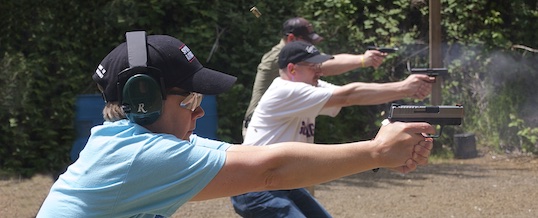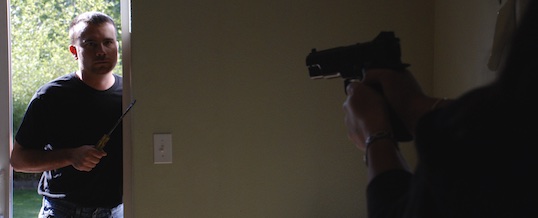
Boring doesn’t sell, and realistic self defense skills are kind of boring.
No matter what you’re trying to get people to buy — from cars to breakfast cereals to political candidates — you have to make it exciting, because if it’s not folks will just pass it by. (Yes, political candidates. Anyone remember Scott Walker? He was an early entry into this year’s Republican field and widely regarded as being phenomenally boring. He went nowhere. Older people will remember Walter Mondale; nice guy, smart, pleasant — and as boring as getting socks for Christmas. He lost too.)
The harsh reality of life is that people aren’t attracted to things which are perceived as unexciting. We don’t spend a lot of time thinking about them, a lot of energy on interacting with them, and our money tends not to go things that don’t excite us. Marketers of all persuasions know this and do their best to liven their products up so that they’ll catch our eyes.
What does this have to do with defensive training?
When it comes right down to it, self defense is really kind of boring. The most important bits of it are (or at least should be) about how to avoid an incident to begin with: things like locks, security lighting, learning how to manage distractions, how to read body language. I’ll concede that it’s all a bit of a snooze-fest.
Even the study of defensive shooting isn’t all that exciting once you get past your first few hundred rounds. The skills needed in perhaps 95% of defensive shootings in the private sector aren’t terribly demanding, and in fact can easily be taught (even with lots of repetitions) in perhaps two training days; if you want to up that percentage into the 99% range, add a day. Once you’re done with that, it’s a matter of regular practice on your own: go to the range, set up some realistic drills, shoot them and correctly interpret the results. Do it again the next week or month, and so on, to keep those skills fresh.
Sounds boring, right? It is. Developing automated skills, those that can be used without your cognitive thought, is called expertise. Expertise is boring, because it’s a matter of learning and then rehearsing those skills under realistic conditions — as much like those under which they will be used. Like the old joke about how to get to Carnegie Hall, the word is “practice”. Practice is seriously boring, which is probably why very few people actually do it.
As I said at the top, boring doesn’t sell. It certainly doesn’t sell any better in the defensive training world than it does anywhere else, and so trainers and commentators try to inject excitement by continually upping their game. What you learned in your last class isn’t sufficient to ensure your safety; you have to take an “advanced” class, then you need a “dynamic mastery” class, and of course who wouldn’t want to sign up for the “ultimate ninja warrior sheepdog way-beyond-those-boring-fundamentals” class?
Money drives marketing
The dirty secret of the training world is that schools have to make a profit, and no one is going to attract enough students to make a profit by giving them what they actually need. The school, to stay solvent, has to continually bring you back for the next, greatest thing — and, of course, in order to get people to buy that they have to make it edgy, exciting, and critically vital!
Magazines and television shows are no different. In the media world being boring is the kiss of death, and so they too need to continually make things exciting so they can sell magazines or justify the price of a commercial slot. Ever heard the old saying about newscasts: “if it bleeds, it leads?” It’s the same thing.The way to make things exciting is to report on how the world is constantly becoming more dangerous and how new threats are always emerging; make it sound as though whatever you learned last week is just not up to the task of protecting yourself this week and you need a whole raft of new “skills” to deal with the “increasing threat”. Of course, then they pause for a word from their sponsors…
There’s a word for this whole phenomenon: enterTRAINment. It’s all about making training into something you want to buy, even if you don’t really need it, by portraying it as exciting and compelling. There’s nothing wrong with that, mind you, if you realize that what you’re doing isn’t really necessary for your survival. It’s when you buy into the idea that you absolutely must take that class on making 100-yard head shots on a moving target with a pistol — one handed, of course — just to be able to go to the mall next week that you’ve gone off the deep end. You’ve become a training enthusiast, a hobbyist who spends limited time and energy on things that really don’t matter. That’s time and energy that could be better spent on honing those skills you’ve learned which are important. Unfortunately, that puts us right back at practice, which as I’ve said is boring.
Proud to be boring!
Here’s a revelation for you: I’m boring. My classes are boring. What I have my students do is boring. What I write and talk about is boring. And it’s all intentionally so.
Now I used to be exciting, but I got out of the excitement business because I realized that it wasn’t doing my students any good. It was great for my bank account, mind you, but I have to be able to sleep at night. So I started teaching boring stuff; the kind of reality-based stuff people actually need to defend themselves and keep themselves safe, with enough practice repetitions so that they start to internalize those necessary foundational skills. I call it the reasonable approach to self defense: no warrior nonsense, no high-speed-low-drag gear necessary, just solid skill development with the kind of tools you’ll actually wear on a daily basis. You know, like real life.
There are other people teaching boring stuff too: my friends Claude Werner and Cecil Burch, for instance, won’t teach you how to take out tangos armed only with a ballpoint pen while rappelling past a window, but they will teach you how to stay out of trouble or grapple with an attacker (respectively). There are other boring people out there too, but they usually won’t have thousands of YouTube followers or say outrageous things just to get your attention. They’re quiet, almost low key, and they only need to say things once to get their point across. If you’re serious about your personal safety (and that of your family and loved ones), seek out the boring guys. They’re the ones who can help you reach your goal.
You can still be Mr. Excitement on Date Nights.
– Grant Cunningham
- Posted by Grant Cunningham
- On March 11, 2016



